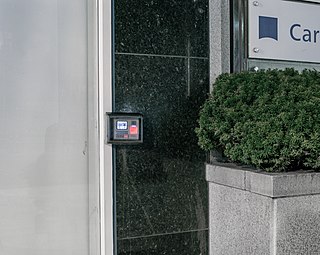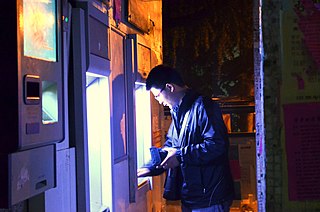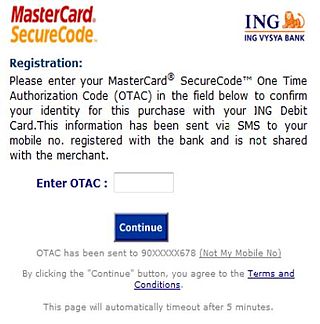Token may refer to:
Token may refer to:

In physical security and information security, access control (AC) is the selective restriction of access to a place or other resource, while access management describes the process. The act of accessing may mean consuming, entering, or using. Permission to access a resource is called authorization.
An authenticator is a means used to confirm a user's identity, that is, to perform digital authentication. A person authenticates to a computer system or application by demonstrating that he or she has possession and control of an authenticator. In the simplest case, the authenticator is a common password.

Authentication is the act of proving an assertion, such as the identity of a computer system user. In contrast with identification, the act of indicating a person or thing's identity, authentication is the process of verifying that identity. It might involve validating personal identity documents, verifying the authenticity of a website with a digital certificate, determining the age of an artifact by carbon dating, or ensuring that a product or document is not counterfeit.

Keystroke logging, often referred to as keylogging or keyboard capturing, is the action of recording (logging) the keys struck on a keyboard, typically covertly, so that a person using the keyboard is unaware that their actions are being monitored. Data can then be retrieved by the person operating the logging program. A keystroke recorder or keylogger can be either software or hardware.

A secure cryptoprocessor is a dedicated computer-on-a-chip or microprocessor for carrying out cryptographic operations, embedded in a packaging with multiple physical security measures, which give it a degree of tamper resistance. Unlike cryptographic processors that output decrypted data onto a bus in a secure environment, a secure cryptoprocessor does not output decrypted data or decrypted program instructions in an environment where security cannot always be maintained.

Authorization or authorisation is the function of specifying access rights/privileges to resources, which is related to general information security and computer security, and to access control in particular. More formally, "to authorize" is to define an access policy. For example, human resources staff are normally authorized to access employee records and this policy is often formalized as access control rules in a computer system. During operation, the system uses the access control rules to decide whether access requests from (authenticated) consumers shall be approved (granted) or disapproved (rejected). Resources include individual files or an item's data, computer programs, computer devices and functionality provided by computer applications. Examples of consumers are computer users, computer software and other hardware on the computer.
RSA SecurID, formerly referred to as SecurID, is a mechanism developed by RSA for performing two-factor authentication for a user to a network resource.

Casino tokens are small discs used in terms of currency in casinos. Colored metal, injection-molded plastic or compression molded clay tokens of various denominations are used primarily in table games, as opposed to metal token coins, used primarily in slot machines. Casino tokens are also widely used as play money in casual or tournament games.

Exonumia are numismatic items other than coins and paper money. This includes "Good For" tokens, badges, counterstamped coins, elongated coins, encased coins, souvenir medallions, tags, wooden nickels and other similar items. It is an aspect of numismatics and many coin collectors are also exonumists.

A one-time password (OTP), also known as a one-time PIN, one-time authorization code (OTAC) or dynamic password, is a password that is valid for only one login session or transaction, on a computer system or other digital device. OTPs avoid several shortcomings that are associated with traditional (static) password-based authentication; a number of implementations also incorporate two-factor authentication by ensuring that the one-time password requires access to something a person has as well as something a person knows.

A security token is a peripheral device used to gain access to an electronically restricted resource. The token is used in addition to, or in place, of a password. It acts like an electronic key to access something. Examples of security tokens include wireless keycards used to open locked doors, or a banking token used as a digital authenticator for signing in to online banking, or signing a transaction such as a wire transfer.
A software token is a piece of a two-factor authentication security device that may be used to authorize the use of computer services. Software tokens are stored on a general-purpose electronic device such as a desktop computer, laptop, PDA, or mobile phone and can be duplicated.

In numismatics, token coins or trade tokens are coin-like objects used instead of coins. The field of token coins is part of exonumia and token coins are token money. Their denomination is shown or implied by size, color or shape. They are often made of cheaper metals like copper, pewter, aluminium, brass and tin, or non-metals like bakelite, leather and porcelain.

A hardware security module (HSM) is a physical computing device that safeguards and manages secrets, performs encryption and decryption functions for digital signatures, strong authentication and other cryptographic functions. These modules traditionally come in the form of a plug-in card or an external device that attaches directly to a computer or network server. A hardware security module contains one or more secure cryptoprocessor chips.

A physical unclonable function, or PUF, is a physical object that for a given input and conditions (challenge), provides a physically defined "digital fingerprint" output (response) that serves as a unique identifier, most often for a semiconductor device such as a microprocessor. PUFs are often based on unique physical variations occurring naturally during semiconductor manufacturing. A PUF is a physical entity embodied in a physical structure. PUFs are implemented in integrated circuits, including FPGAs, and can be used in applications with high-security requirements, more specifically cryptography, Internet of Things (IOT) devices and privacy protection.
In computer systems, an access token contains the security credentials for a login session and identifies the user, the user's groups, the user's privileges, and, in some cases, a particular application. In some instances, one may be asked to enter an access token rather than the usual password.

Multi-factor authentication is an electronic authentication method in which a user is granted access to a website or application only after successfully presenting two or more pieces of evidence to an authentication mechanism. MFA protects personal data—which may include personal identification or financial assets—from being accessed by an unauthorized third party that may have been able to discover, for example, a single password.
A trusted execution environment (TEE) is a secure area of a main processor. It helps code and data loaded inside it to be protected with respect to confidentiality and integrity. Data integrity prevents unauthorized entities from outside the TEE from altering data, while code integrity prevents code in the TEE from being replaced or modified by unauthorized entities, which may also be the computer owner itself as in certain DRM schemes described in SGX. This is done by implementing unique, immutable, and confidential architectural security such as Intel Software Guard Extensions which offers hardware-based memory encryption that isolates specific application code and data in memory. Intel SGX allows user-level code to allocate private regions of memory, called enclaves, which are designed to be protected from processes running at higher privilege levels. A TEE as an isolated execution environment provides security features such as isolated execution, integrity of applications executing with the TEE, along with confidentiality of their assets. In general terms, the TEE offers an execution space that provides a higher level of security for trusted applications running on the device than a rich operating system (OS) and more functionality than a 'secure element' (SE).
Reliance authentication is a part of the trust-based identity attribution process whereby a second entity relies upon the authentication processes put in place by a first entity. The second entity creates a further element that is unique and specific to its purpose, that can only be retrieved or accessed by the authentication processes of the first entity having first being met.
JSON Web Token is a proposed Internet standard for creating data with optional signature and/or optional encryption whose payload holds JSON that asserts some number of claims. The tokens are signed either using a private secret or a public/private key.